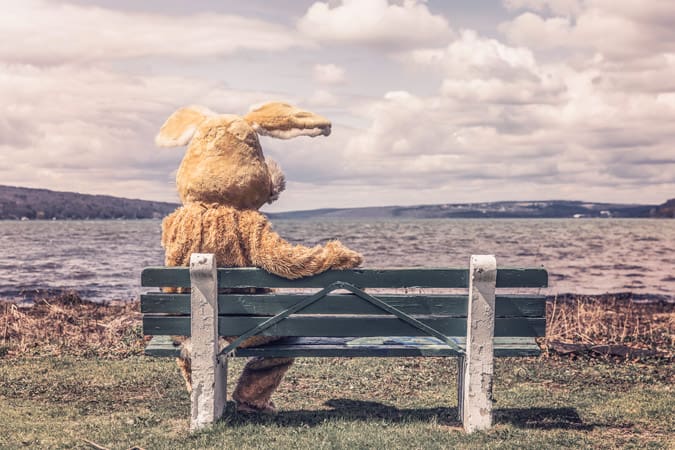Reality is a casino. Here’s how to beat the house.
Reading time: 6 minutes 33 seconds
On Sunday, April 11th, 2004, Ashley Revell stood in the Plaza Hotel & Casino in Las Vegas far from his home in Kent, England. Heart pounding out of his chest, he fiddled with the crisp white shirt under his rented tuxedo as he stared at the roulette table.
Adjusting his collar, he took a deep breath. The audience that crowded around him went silent as the dealer threw the ball in. Ashley moved all his chips forward on the velvet-covered table as he said ‘Red’. It was everything he owned.
Literally.
Having just turned 32, Ashley’s father had been getting on his case about settling down. All his friends were getting married and having families. When would he find someone?
One day Ashley came home with an insane idea. It didn’t go over well. Where on earth did he come up with such a hair-brained scheme?
It was at a local pub. Ashley overheard someone discussing a hypothetical scenario.
“What if you sold everything you owned and put it all on a ‘single bet’?”
Imagine.
Ashley couldn’t stop imagining. The idea wouldn’t leave his mind. He told his friends about it. They laughed.
When he began to do it, they stopped laughing.
Ashley sold everything he owned. His car, his watch, his books, his golf clubs, even his clothes. The total came to $135,300 (£76,840).
Moments before the ball was thrown in, Ashley went over to his Mum and hugged her. He shook hands with his Dad. As the roulette wheel began to spin, he stared at the tiny ball, swirling. The wheel slowed, the ball bouncing as if in slow motion. Everybody held their breath.
We are all guessing and gambling through life.
While most of us will never wager our worldly possessions in a casino, every day we place bets on our futures, unaware of the stakes.
Our brains are prediction machines and we spend our lives making guesses about what we expect will happen and then gambling our attention, energy, resources, and actions on these guesses.
The big problem is that we don’t realize we are doing it. Instead, we fall into the trap of thinking that we can be certain of how things are going to work out when, in reality, we can’t.
We love to simplify things for ourselves. We want our predictions to be true so we develop certainty and this very desire can blind us to seeing things from a different perspective.
We struggle with cognitive biases such as the confirmation bias where we look for evidence to confirm that we are correct and dismiss evidence that contradicts us. We experience an overconfidence bias where we feel we know more than we do. We get a false sense of certainty which makes us overestimate how much control we exert over our future.
This is a problem.
If you are to make the best decisions possible and think in the most effective way, you need to understand the limits of your own point of view.
Life is poker. Reality is the house.
Annie Duke, the author of ‘Thinking in Bets’, describes how life is more like poker than chess. While chess has all the information you need to succeed, poker involves taking action when you don’t have all the information. While chess involves skill, poker involves skill and luck. While chess doesn’t involve outright deception, poker involves bluffing and pretending things are true when they are not. For these reasons, life is a lot like poker.
While Annie uses the metaphor of life as a ‘game’, oftentimes it doesn’t feel that way. Instead, it can feel like things are rigged. Systemically. Historically. Geographically. Much of our life’s trajectory is determined by our birthplace and the groups we belong to. Some of us are more privileged than others. Some just seem to have it all.
Reality can seem more like a casino or ‘the house’. Even if we have a lot of advantages, we all feel like underdogs in our own lives. Reality is not a game. Reality, it appears, is what we are up against.
There are those who have succeeded. The rich ones. The famous ones. The winners. And there are the rest of us. We almost expect to lose. But we dream of winning.
Luck
The ball jumped around the wheel like it was dancing on hot coals. It finally found a spot where it could rest.
RED SEVEN.
The crowd went wild. Ashley beamed. His parents jumped up and down. $135,300 became $270,600
We love stories like Ashley’s because we love the idea that an ‘ordinary person’ can triumph against the odds. We all know that great success rarely comes to those who play it safe. To win at life, we understand that risk-taking is part of the deal. That doesn’t mean we should go out and do what Ashley did. Indeed, you could destroy your life with such a wager.
It does mean that we need to recognize what is at play when we make decisions in life. A billionaire I once worked with suggested luck played a huge role in their success. We don’t like to admit this because it takes some of the agency away from us, but ignoring fortune means ignoring reality.
The many gambles of life.
When you start a business, you are taking a big gamble. When you get married, you are taking a big gamble. When you have children, you are taking a big gamble.
You are betting on your idea. You are betting on your relationship. You are betting on having a family. You are betting your energy, money, and especially your time that these things will make you happy.
Life is a series of guesses and gambles. You guess what you think is going to happen and then you put your money/time/energy/action where your mouth is.
You guess ‘What do I think is the best decision?’ or ‘What is the best action to take now?’
You gamble with the actions you take. You gamble with where you spend your time. You gamble with how hard you work.
Just like every other gamble, the more you put in, the higher the potential ROI. If you want to succeed in business, you have to put in the hours. Then, you have to catch the breaks.
If you want to have a happy relationship, you have to put in the work and find someone that you gel with. The work by itself isn’t enough. But it helps. A lot.
It’s not as simple as doing X and Y will happen. Life is never that straightforward. Instead, when you do X, it makes Y more likely to happen. It increases the probability. It gives you an edge. Then you hope the ball will fall on RED SEVEN.
The key to remember is that you can’t be sure of much in life. Knowing that, recognize that you are guessing and gambling, and understand the key is to make the best possible guess so you can improve your chances of winning.
How to make better decisions in life.
So how do you navigate your unpredictable life when so much is at stake? You must learn to make better guesses and better gambles. Here are some suggestions that can help:
1. Consider a challenge that you are facing.
- What do you think will happen?
- What do you think is the best decision?
2. Evaluate the probabilities at play.
- How likely do you think you are right?
- What percentage chance do you give it?
3. How can you give yourself the best chance of winning?
- What are you willing to do?
- How much time will you invest?
- How much energy will you give this?
4. Be prepared to be wrong.
- What will you do if you are incorrect?
5. Understand the other possibilities.
- What else do you think is possible?
6. Learn from it.
- What lessons can you learn from this experience?
These six steps will help you to improve how you make decisions in life and make sure that you don’t fall for the trap of confusing your certainty with reality.
For example, these steps can guide you when deciding on a job offer or whether to accept a new opportunity. The beauty of this approach is that it factors luck into the equation. So does life.
Ashley versus the house.
Stories like Ashley’s are the exception rather than the rule.
Our lives are filled with gambles, big and small. By recognizing that we are always betting on something and we cannot be 100% sure as to how things will turn out, we can make more informed wagers with our time, money, and energy.
Ultimately, we know what happens at the end of stories like Ashley’s. Eventually, the house always wins, doesn’t it?
Not this time.
Elated and massively relieved, Ashley tipped the dealer $600 and refused to bet again. He took his winnings of $270,600 and started up his own online poker company which he worked at for the next few years. While that venture came to an end seven years later, he spent the remaining money on a motorcycle trip across Europe.
While on that trip, he met his future wife.
Ashley finally settled down.
Thanks,
Owen.
P.S. ‘Why things go wrong and how to make them go right’ is my latest Changing Minds podcast episode – you can watch or listen to it here.





